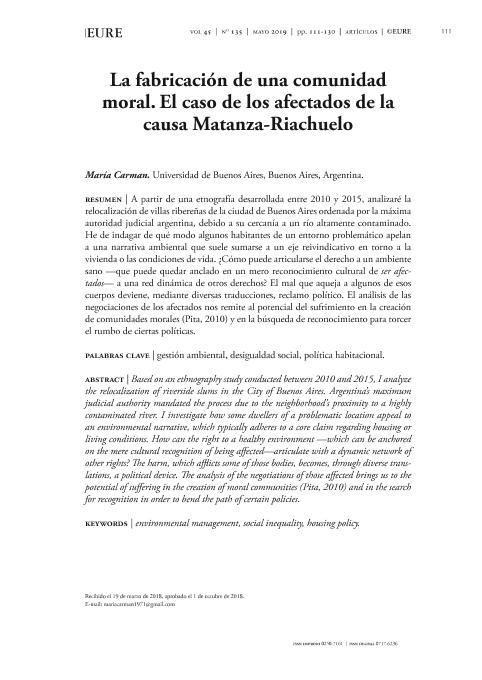Mostrar el registro sencillo del ítem
dc.contributor.author
Carman, Maria

dc.date.available
2021-02-01T12:32:01Z
dc.date.issued
2019-05
dc.identifier.citation
Carman, Maria; La fabricación de una comunidad moral: el caso de los afectados de la causa Matanza-Riachuelo; Pontificia Universidad Católica de Chile. Facultad de Arquitectura, Diseño y Estudios Urbanos. Instituto de Investigación y Posgrado; Eure (Santiago); 45; 135; 5-2019; 111-130
dc.identifier.issn
0250-7161
dc.identifier.uri
http://hdl.handle.net/11336/124318
dc.description.abstract
A partir de una etnografía desarrollada entre 2010 y 2015, analizaré la relocalización de villas ribereñas de la ciudad de Buenos Aires ordenada por la máxima autoridad judicial argentina, debido a su cercanía a un río altamente contaminado. He de indagar de qué modo algunos habitantes de un entorno problemático apelan a una narrativa ambiental que suele sumarse a un eje reivindicativo en torno a la vivienda o las condiciones de vida. ¿Cómo puede articularse el derecho a un ambiente sano —que puede quedar anclado en un mero reconocimiento cultural de “ser afectados”— a una red dinámica de otros derechos? El mal que aqueja a algunos de esos cuerpos deviene, mediante diversas traducciones, reclamo político. El análisis de las negociaciones de los afectados nos remite al potencial del sufrimiento en la creación de comunidades morales (Pita, 2010) y en la búsqueda de reconocimiento para torcer el rumbo de ciertas políticas.
dc.description.abstract
Based on an ethnography study conducted between 2010 and 2015, I analyze the relocalization of riverside slums in the City of Buenos Aires. Argentina's maximum judicial authority mandated the process due to the neighborhood's proximity to a highly contaminated river. I investigate how some dwellers of a problematic location appeal to an environmental narrative, which typically adheres to a core claim regarding housing or living conditions. How can the right to a healthy environment —which can be anchored on the mere cultural recognition of “being affected”—articulate with a dynamic network of other rights? The harm, which afflicts some of those bodies, becomes, through diverse translations, a political device. The analysis of the negotiations of those affected brings us to the potential of suffering in the creation of moral communities (Pita, 2010) and in the search for recognition in order to bend the path of certain policies.
dc.format
application/pdf
dc.language.iso
spa
dc.publisher
Pontificia Universidad Católica de Chile. Facultad de Arquitectura, Diseño y Estudios Urbanos. Instituto de Investigación y Posgrado
dc.rights
info:eu-repo/semantics/openAccess
dc.rights.uri
https://creativecommons.org/licenses/by-nc/2.5/ar/
dc.subject
Gestión ambiental
dc.subject
Desigualdad social
dc.subject
Política habitacional
dc.subject.classification
Otras Humanidades

dc.subject.classification
Otras Humanidades

dc.subject.classification
HUMANIDADES

dc.title
La fabricación de una comunidad moral: el caso de los afectados de la causa Matanza-Riachuelo
dc.title
The fabrication of a moral community. The case of the victims of the Matanza-Riachuelo litigation
dc.type
info:eu-repo/semantics/article
dc.type
info:ar-repo/semantics/artículo
dc.type
info:eu-repo/semantics/publishedVersion
dc.date.updated
2021-01-27T19:16:29Z
dc.identifier.eissn
0717-6236
dc.journal.volume
45
dc.journal.number
135
dc.journal.pagination
111-130
dc.journal.pais
Chile

dc.description.fil
Fil: Carman, Maria. Universidad de Buenos Aires. Facultad de Ciencias Sociales. Instituto de Investigaciones "Gino Germani"; Argentina. Consejo Nacional de Investigaciones Científicas y Técnicas; Argentina
dc.journal.title
Eure (Santiago)

dc.relation.alternativeid
info:eu-repo/semantics/altIdentifier/url/https://scielo.conicyt.cl/scielo.php?script=sci_arttext&pid=S0250-71612019000200111
dc.relation.alternativeid
info:eu-repo/semantics/altIdentifier/doi/http://dx.doi.org/10.4067/S0250-71612019000200111
Archivos asociados
